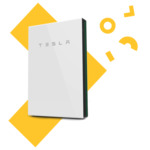Save $2,300 off the 13.5 kW Tesla Powerwall.
Plus sign up to the Origin Loop virtual power plant (VPP) and stay connected for five years to save a further $1,500.
You may choose whichever Origin Energy plan you like, however, the 14c FIT is only applicable to Solar Boost Plus plans.
Interested in everyone's thoughts around VPP and if the discount is worth the intermittent power drain.
Interest free plans available.
Not available in all areas. Price for a standard installation within 50 km of the Sydney, Melbourne, Brisbane, Wollongong and Gold Coast CBDs.
Mod 26/7: Edited title. The $1500 off after 5 years is included in the $13,995 price (thus why it says 'from $13,995'), it is $15,495 initially ($2,300 off).


@NuttyGoodness: It will be at about 90% capacity then. This isn't 1995 any more.